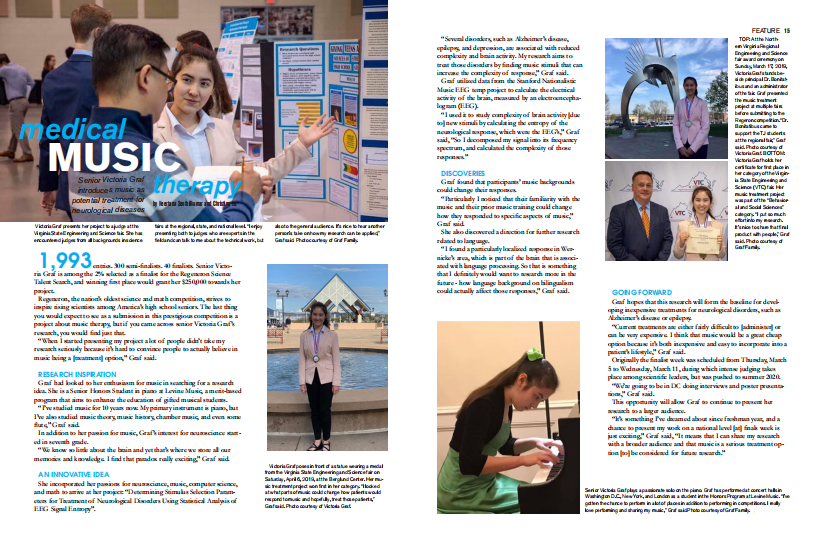Medical music therapy
Victoria Graf introduces music as potential treatment for neurological diseases
April 5, 2020
*This article was originally intended to be published in the March 2020 print issue of tjTODAY. With the sudden closure of Fairfax County Public Schools in reaction to COVID-19, we transferred this story to tjTODAY’s online website. Due to safety concerns resulting from COVID-19, Regeneron Science Talent Search (STS) postponed its finalist week to the summer, which is reflected in this article.
1,993 entries. 300 semi-finalists. 40 finalists. Senior Victoria Graf is among the 2% selected as a finalist for the Regeneron Science Talent Search, and winning first place would grant her $250,000 towards her project.
Regeneron, the nation’s oldest science and math competition, strives to inspire rising scientists among America’s high school seniors. The last thing you would expect to see as a submission in this prestigious competition is a project about music therapy, but if you came across senior Victoria Graf’s research, you would find just that.
“When I started presenting my project a lot of people didn’t take my research seriously because it’s hard to convince people to actually believe in music being a [treatment] option,” Graf said.
Research Inspiration
Graf had looked to her enthusiasm for music in searching for a research idea. She is a Senior Honors Student in piano at Levine Music, a merit-based program that aims to enhance the education of gifted musical students.
“I’ve studied music for 10 years now. My primary instrument is piano, but I’ve also studied music theory, music history, chamber music, and even some flute,” Graf said.
In addition to her passion for music, Graf’s interest for neuroscience started in seventh grade.
“We know so little about the brain and yet that’s where we store all our memories and knowledge. I find that paradox really exciting,” Graf said.
An innovative idea
She incorporated her passions for neuroscience, music, computer science, and math to arrive at her project: “Determining Stimulus Selection Parameters for Treatment of Neurological Disorders Using Statistical Analysis of EEG Signal Entropy”.
“Several disorders, such as Alzheimer’s disease, epilepsy, and depression, are associated with reduced complexity and brain activity. My research aims to treat those disorders by finding music stimuli that can increase the complexity of response,” Graf said.
Graf utilized data from the Stanford Nationalistic Music EEG temp project to calculate the electrical activity of the brain, measured by an electroencephalogram (EEG).
“I used it to study complexity of brain activity [due to] new stimuli by calculating the entropy of the neurological response, which were the EEG’s,” Graf said, “So I decomposed my signal into its frequency spectrum, and calculated the complexity of those responses.”
Discoveries
Graf found that participants’ music backgrounds could change their responses.
“Particularly I noticed that their familiarity with the music and their prior music training could change how they responded to specific aspects of music,” Graf said.
She also discovered a direction for further research related to language.
“I found a particularly localized response in Wernicke’s area, which is part of the brain that is associated with language processing. So that is something that I definitely would want to research more in the future – how language background on bilingualism could actually affect those responses,” Graf said.
Going Forward
Graf hopes that this research will form the baseline for developing inexpensive treatments for neurological disorders, such as Alzheimer’s disease or epilepsy.
“Current treatments are either fairly difficult to [administer] or can be very expensive. I think that music would be a great cheap option because it’s both inexpensive and easy to incorporate into a patient’s lifestyle,” Graf said.
Originally, the finalist week was scheduled from Thursday, March 5 to Wednesday, March 11, during which intense judging takes place among scientific leaders, but was pushed to summer 2020.
“We’re going to be in DC doing interviews and poster presentations,” Graf said.
This opportunity will allow Graf to continue to present her research to a larger audience.
“It’s something I’ve dreamed about since freshman year, and a chance to present my work on a national level [at] finals week is just exciting,” Graf said, “It means that I can share my research with a broader audience and that music is a serious treatment option [to] be considered for future research.”






